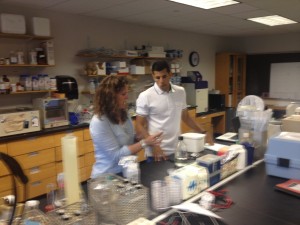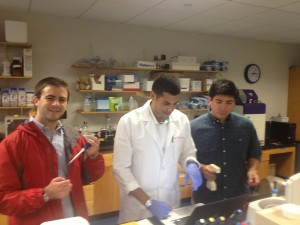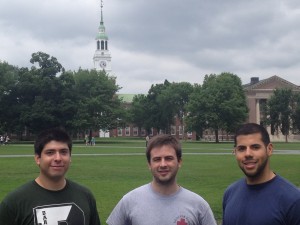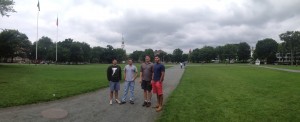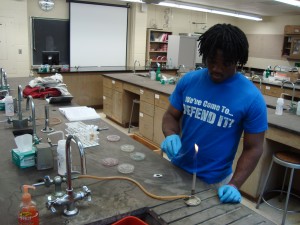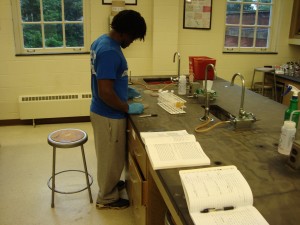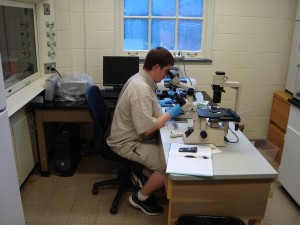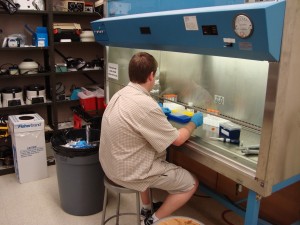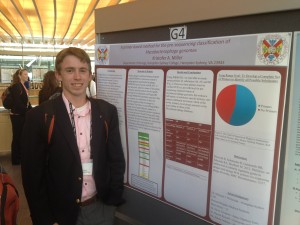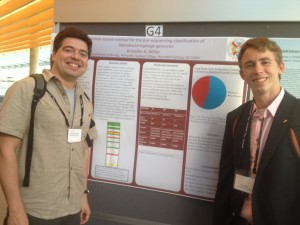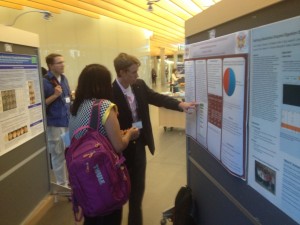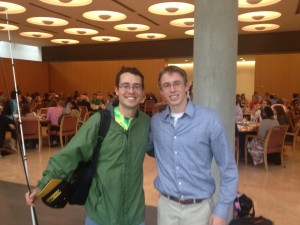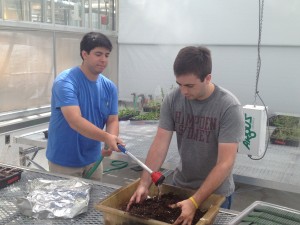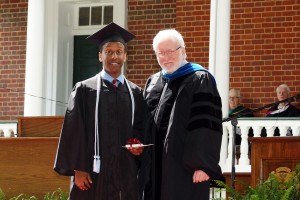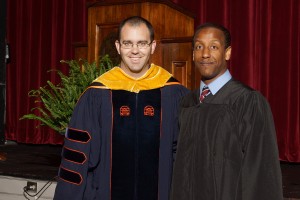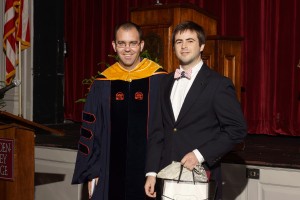Professor Werth’s Biology 261 Evolutionary Ecology class recently returned from another May Term trip to Ecuador, where they took a weeklong cruise through the Galapagos Islands and toured the rain forest and Andes Mountains. Highlights included snorkeling with sea turtles, sea lions, penguins, marine iguanas, sharks, rays, eels, and many fish and other forms of marine life, along with two volcano hikes to 17,000 feet. They also visited caves, waterfalls, mangrove forests, and countless other habitats while learning about biodiversity and adaptation. It’s always fun having class at night on the top deck of a boat, under the stars…
Author Archives: admin
Dr. Kristian M. Hargadon ’01 Publishes Article on Melanoma Immunotherapy
Elliott Assistant Professor of Biology Dr. Kristian M. Hargadon ’01 recently published a review article on melanoma immunotherapy in a special issue on melanoma research for the Journal of Cosmetics, Dermatological Sciences & Applications. This article highlights work in this area of research over the last several decades, with particular emphasis on the identification of melanoma tumor antigens that began in the early 1990s and the use of these antigens as targets of a variety of melanoma immunotherapies that include peptide-, protein-, and DNA-based cancer vaccines, dendritic cell-based immunization maneuvers, and adoptive T cell transfer therapies. The article also discusses a number of key issues that continue to limit the efficacy of many current melanoma immunotherapies, and it highlights areas for future study in this field that may lead 1) to improved understanding of how melanomas dampen anti-tumor immune responses and 2) to strategies for improving anti-tumor immune responses elicited by melanoma immunotherapies.
Gilmer Hall: New England branch
Three H-SC biologists are currently working up north and representing the department in New England. Two of them, James Hughes ’14 and Alan Fish ’14, are working with Assistant Professor Mike Wolyniak at the Geisel School of Medicine at Dartmouth. James is focusing on the annotation of the genome of a bacteriophage discovered at Hampden-Sydney while Alan is studying cell division properties in the budding yeast Saccharomyces cerevisiae. Both of them are assisting Dr. Wolyniak with his work on genetic knockout strains of Arabidopsis thaliana, a plant used in the study of genetics.
Meanwhile, Giovanni Torres ’14 has been working on a project of his own design with Dr. Jennifer Rocklein-Canfield at Simmons College in Boston. Gio is cloning human genes involved in the formation of keloid scars and developing a series of DNA constructs in which interactions between human proteins can be studied in a yeast model.
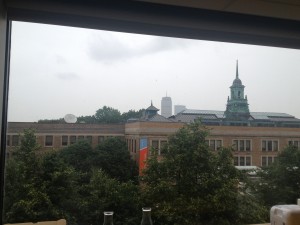
The view from Gio’s lab—-Boston’s signature skyscrapers, the Prudential Center and the John Hancock Tower, are visible in the center
The Dartmouth crew visited Gio and Dr. Canfield for a joint lab meeting in which all 3 H-SC students could discuss their summer projects and plan future experiments.
David Coe ’14 Studies Bacterial Eye Pathogens
David Coe ’14 is being funded by the Hampden-Sydney College Honors Council and a Sears Fellowship to conduct research at H-SC this summer on the antibiotic susceptibility and resistance of bacterial eye pathogens. Under the guidance of Dr. Kristian M. Hargadon, Elliott Assistant Professor of Biology, David is employing the Kirby-Bauer method to study antibiotic resistance/susceptibility of several bacteria known to cause infections of the eye. Specifically, David’s work focuses on Haemophilus aegyptius, Neisseria gonorrhoeae, Pseudomonas aeruginosa, and Staphylococcus aureus, and he is evaluating the susceptibility of these organisms to commonly prescribed antibiotics that include penicillin, tetracyclin, streptomycin, and chloramphenicol. David will also be evaluating whether these pathogens acquire increased resistance to these antibiotics over time by studying how their antibiotic susceptibility changes over multiple generations of growth. David plans to attend medical school following his graduation next spring!
————————————————————————————————
From David himself:
I am really enjoying my time here on campus doing my research and relaxing with other biology majors. I am 3 weeks into a 6 week research project in which I am analyzing four bacteria known to cause bacterial conjunctivitis (pink eye) with four commercially used antibiotics. So far I have managed to see sufficient growth and data from three of the four bacteria and am keeping my fingers crossed on the other. I find it so interesting to see how treating one culture with an antibiotic then growing bacteria from that same culture can show a significant gain in antibiotic resistance in just 24 hours. Along with Dr. Hargadon we have also found a “mutant” strain of P. aeruginosa, which so far has been resistant to all four antibiotics. With all my data I am hoping to look at different health care providers and see just how much they charge for the use of each antibiotic, and I would like to determine whether U.S. health providers are making decisions on financial benefit or health benefit.
Drake Bishop ’14 Conducts Summer Research on Melanoma Immunity
Through support of the Hampden-Sydney College Honors Council, the Virginia Foundation for Independent Colleges, and Sigma Xi, Drake Bishop ’14 is conducting research at Hampden-Sydney College this summer in collaboration with Dr. Kristian M. Hargadon, Elliott Assistant Professor of Biology. Drake is studying how melanoma-derived factors influence the maturation and activation of dendritic cells, an immune cell that plays a critical role in the induction of anti-tumor immune responses. Previous work in Dr. Hargadon’s laboratory has studied this phenomenon in vitro using dendritic cell lines grown in culture. Drake’s work represents an extension of these earlier studies, as he is employing an ex vivo model system that involves isolation of natural dendritic cells from the spleens of mice. Drake will continue this work during his senior year Departmental Honors Project in Biology. Upon graduation, Drake will attend Eastern Virginia Medical School, where he was accepted during his sophomore year through H-SC’s early assurance program with EVMS!
Kris Miller ’13 presents his research at national Howard Hughes Medical Institute conference
The Howard Hughes Medical Institute (HHMI) recently held its annual symposium for students and faculty in the Science Education Alliance-Phage Hunters Advancing Genomics and Evolutionary Science (SEA-PHAGES) project. Hampden-Sydney is one of ~80 schools nationwide in the project in which students isolate and characterize novel bacteriophage from the environment. Recent graduate Kris Miller ’13 presented his research on developing a quick and easy way to identify the type of bacteriophage identified without the expense of whole genome sequencing:
Now in its sixth year, the SEA-PHAGES program has successfully created a national network in which undergraduates can engage in authentic research experiences and develop compelling research questions based on the work of students at other institutions.
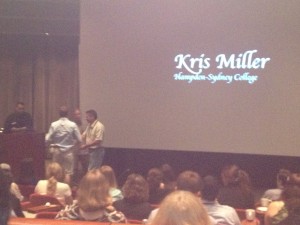
Miller receiving his participant certificate and meeting Dr. Graham Hatfull of the University of Pittsburgh, SEA-PHAGES scientific leader, and Dr. David Asai, HHMI Undergraduate Science Education Program Director
The SEA-PHAGES symposium is held at HHMI’s Janelia Farm research facility in Ashburn, Virginia, home to research teams performing cutting edge research on neurobiology and development.
Hampden-Sydney biology student summer research
The summer months are a time in which many of Hampden-Sydney’s biology students undertake research projects and internships both at the College and at other institutions of all types. In the coming weeks this blog will feature the experiences of several of Hampden-Sydney’s biologists during their summer experiences…check back often to learn more about their endeavors!
Yonathan Ararso ’13 Receives Highest Research Honor at Graduation
Yonathan Ararso, a biology major in the class of 2013, was recently awarded the Samuel S. Jones Phi Beta Kappa Award for original research at Hampden-Sydney’s 2013 Commencement Ceremony. The award, in the form of a gold medallion and a $4,000.00 cash prize, is one of the most prestigious and lucrative awards given at college and university graduations across the country. Yonathan received the award for his Senior Honors Project in Biology entitled “An shRNA-mediate RNA Silencing Approach to Understand the Role of Melanoma-derived Factors in the Suppression of Dendritic Cell Maturation and Activation.” He conducted his project under the mentorship of Dr. Kristian M. Hargadon ’01, Elliott Assistant Professor of Biology. Yonathan plans to pursue graduate education and will be applying to M.D./Ph.D. programs in the fall.
Congratulations Biology Class of 2013!
We wish our graduates the best of luck as they finish their Hampden-Sydney careers!
Yonathan Ararso
Seth Ayres
Burke Best
John Bishop
Joe Chambers
Nick DeProspero
Kevin Gutermuth
Brent Hyler
Chris Kampfmueller
Greg Knabel
Patrick Kuhns
Kris Miller
Jacob Oliver
John Michael Sparagna
Tyler White
Biology awards at the Final Convocation
Each April the biology department recognizes some of its most outstanding students as a part of the College’s Final Convocation exercises. This year’s James R.T. Hewett Award for service and leadership to the department was given to Yonathan Ararso. Yonathan conducted departmental honors research on tumor immunology and was instrumental in helping to launch both the department’s Colloqiuim student seminar series and the Hampden-Sydney Journal of the Sciences.
The department’s H.B. Overcash award, given to the department’s top pre-medical student in the junior class, was given to James Hughes ’14.
Also at the ceremony, Dr. Mike Wolyniak received the College’s John Peter Mettauer Award for Excellence in Research in recognition of his work with the Undergraduate Phenotyping of Arabidopsis Knockouts (UNPAK) and Howard Hughes Medical Institute (HHMI) Science Education Alliance-Phages Hunters Advancing Genomics and Evolutionary Science (SEA-PHAGES) projects.

